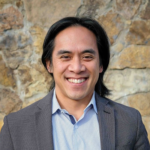
25 Sep September 25, 2023 – Gluten Free Mightylicious Carolyn Haeler and Open System Education Landon Mascareñaz & Doannie Tran
Carolyn Haeler – CEO of Mightylicious Bakery – How to Build a Gluten Free Cookie Company
In the beginning, I was still making all of the Mightylicious gluten
free cookies by hand, still working full time. I had a job and worked
both until I could not manage both.

Carolyn Haeler
Carolyn Haeler is the CEO of Mightylicious Bakery, a popular bakery known for its delicious and healthy treats. With a passion for baking and a commitment to quality ingredients, Carolyn has grown the business into a thriving brand with a loyal customer base. Under her leadership, Mightylicious has expanded its offerings to include vegan and gluten-free options, catering to a wider range of customers. Carolyn Haeler is a celiac sufferer who spent years seeking out gluten-free cookie brands. One busy holiday season, she was disappointed yet again when a gluten-free cookie crumbled entirely after one bite. That’s when she realized there had to be a better way, and as one smart cookie herself, she was determined to create a cookie that was gluten-free, healthy, and above all, irresistibly delicious. So, she left her lucrative job at Morgan Stanley and started the MIGHTYLICIOUS GF cookie company. Now available in 7 varieties at Walmart and many other retail venues (and AMAZON of course). They will knock your taste buds socks off! Kof-K kosher certified with dairy and vegan varieties available. (You wont believe they are gluten free.)
Landon Mascareñaz and Doannie Tran – Authors of the book
Any school can become future oriented if it brings
in the community to have that conversation.

Landon Mascareñaz
Landon is an educator, writer, and democracy builder. As co-founder of the Open Systems Institute, he partners with leaders around the country to encourage an emerging discipline for openers everywhere. He is the current elected chair of the Colorado State Board for Community Colleges & Occupational Education, appointed by Colorado Governor Jared Polis. He also serves as chair of the Reisher Scholars Program, supporting students across the state to achieve their higher education goals. His new book, The Open System: Redesigning Education & Reigniting Democracy was released by Harvard Education Press this June. He is senior partner at the Colorado Education Initiative (CEI) where he is responsible for community-driven economic development through breakthrough partnerships in the Homegrown Talent Initiative, working in sixty rural districts across eight regions of the state. In his previous role at CEI he helped assemble the Sin Fronteras Education Partnership, a coalition of local, regional, and national organizations co-creating family partnership strategies for New Mexico communities, and he supported the launch of Colorado’s Statewide Family Engagement Center. During the first six months of the COVID crisis, Landon worked with community organizations to deploy the Denver Metro Emergency Food Network, which delivered over 320 thousand free meals to families and elderly people in need. At the start of the Russian invasion of Ukraine, he worked with friends and partners to help launch Palaces for People to house refugees. He has previously led partnerships at A+ Colorado, served as a leader in the family engagement department in Denver Public Schools, co-designed the launch of the NACA Inspired Schools Network (a network of indigenous serving schools), led Teach For America–New Mexico, and taught first grade on the Navajo Nation. In 2015 he completed his doctorate at the Harvard Graduate School of Education with a focus on boundary-spanning leadership. Landon was born in California, raised in Colorado, attended college in Oregon, and began his professional career in New Mexico—leading him to consider the western United States his home. He lives in Denver, Colorado, with his wife and enjoys traveling, learning about ancient history, and developing his meditation practice.
 Doannie Tran taught middle school and high school science in both Oakland, California, and Boston, Massachusetts, before leaving teaching to help launch the Massachusetts region of Teach For America in 2009. Doannie was responsible for professional development for all new TFA teachers in Massachusetts and he built up their partnership with Boston University, where he has also served on faculty. During that time, the Massachusetts region was in the top 10% of all TFA regions in terms of effectiveness, satisfaction and retention of teachers. While doing his doctoral work at the Harvard Graduate School of Education, he was sponsored as an Entrepreneur-in-Residence at NewSchools Venture Fund, launching an education technology company called the Teaching Genome. Doannie left his startup to join the leadership team of Boston Public Schools as Assistant Superintendent for Academics and Professional Learning. He led the inter-departmental team that worked with the Boston Teachers’ Union to develop the Essentials for Instructional Equity, the district’s vision for instruction that would close opportunity gaps. The Essentials were recently recognized as a “bright spot” in the district by the Massachusetts Department of Elementary and Secondary Education. Before joining the team at the Center for Innovation in Education, Doannie served as the Assistant Superintendent for Innovative Programs for Fulton County, Georgia. He oversaw the design of two innovative high school models and also supported the development of the district’s professional learning strategy based on the implementation of PLCs at every level from the Cabinet to teachers. Currently, Doannie is the Partner for Liberatory Co-Creation at the Center for Innovation in Education where he focuses on family and community empowerment as a lever for systems change. He has helped launch community co-creation projects nationwide, bringing family and community members into co-creation with the North Dakota Department of Public Instruction, the Kentucky Department of Education, and Atlanta Public Schools. Doannie is also co-founder of the Open Systems Institute, which develops the capacity of leaders to co-create and co-produce with communities.
Doannie Tran taught middle school and high school science in both Oakland, California, and Boston, Massachusetts, before leaving teaching to help launch the Massachusetts region of Teach For America in 2009. Doannie was responsible for professional development for all new TFA teachers in Massachusetts and he built up their partnership with Boston University, where he has also served on faculty. During that time, the Massachusetts region was in the top 10% of all TFA regions in terms of effectiveness, satisfaction and retention of teachers. While doing his doctoral work at the Harvard Graduate School of Education, he was sponsored as an Entrepreneur-in-Residence at NewSchools Venture Fund, launching an education technology company called the Teaching Genome. Doannie left his startup to join the leadership team of Boston Public Schools as Assistant Superintendent for Academics and Professional Learning. He led the inter-departmental team that worked with the Boston Teachers’ Union to develop the Essentials for Instructional Equity, the district’s vision for instruction that would close opportunity gaps. The Essentials were recently recognized as a “bright spot” in the district by the Massachusetts Department of Elementary and Secondary Education. Before joining the team at the Center for Innovation in Education, Doannie served as the Assistant Superintendent for Innovative Programs for Fulton County, Georgia. He oversaw the design of two innovative high school models and also supported the development of the district’s professional learning strategy based on the implementation of PLCs at every level from the Cabinet to teachers. Currently, Doannie is the Partner for Liberatory Co-Creation at the Center for Innovation in Education where he focuses on family and community empowerment as a lever for systems change. He has helped launch community co-creation projects nationwide, bringing family and community members into co-creation with the North Dakota Department of Public Instruction, the Kentucky Department of Education, and Atlanta Public Schools. Doannie is also co-founder of the Open Systems Institute, which develops the capacity of leaders to co-create and co-produce with communities.
